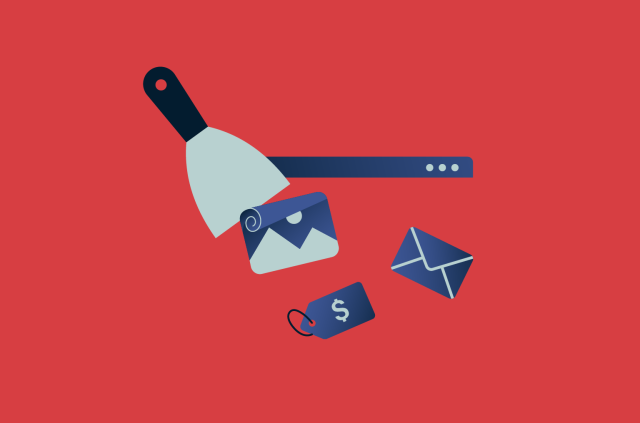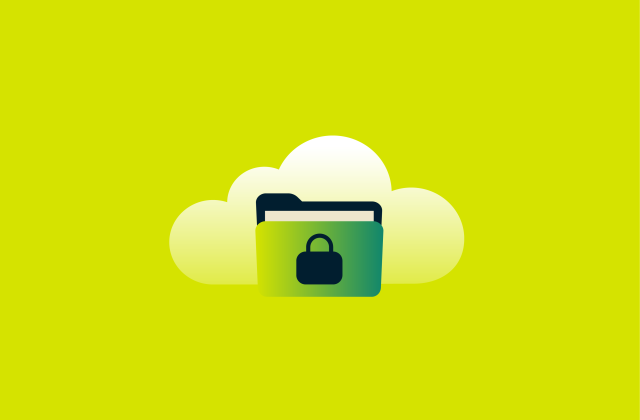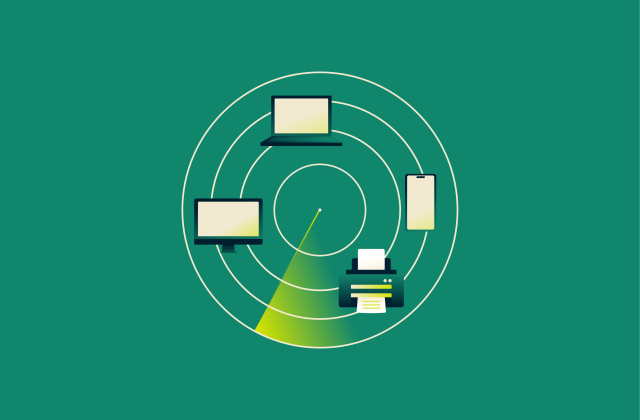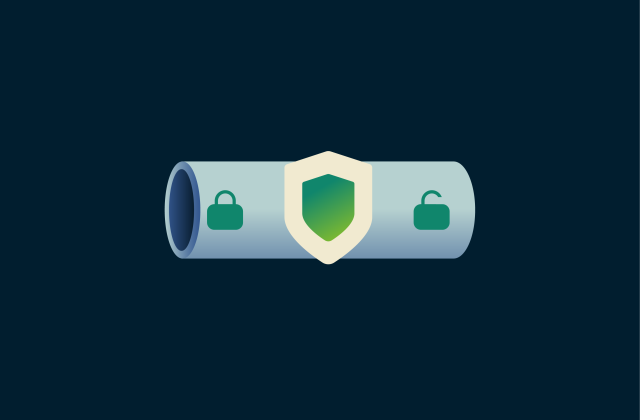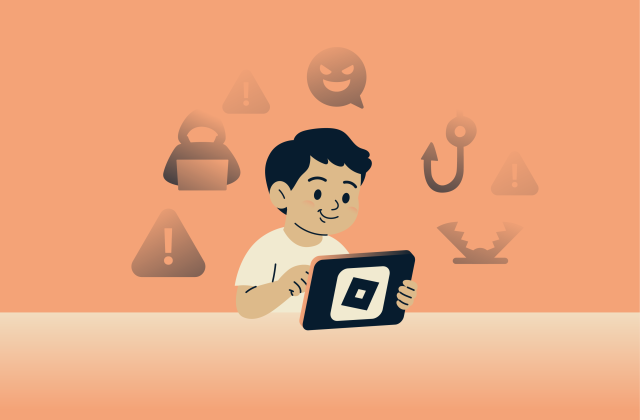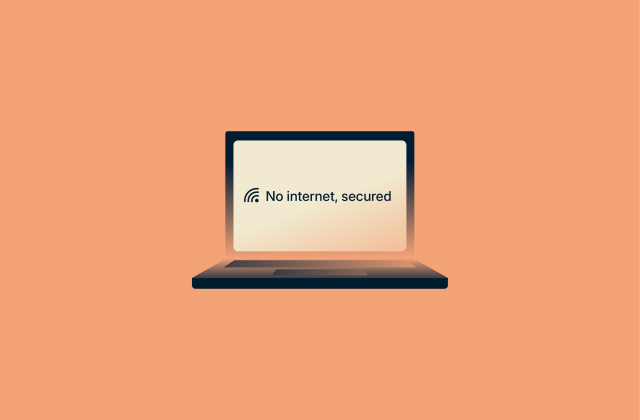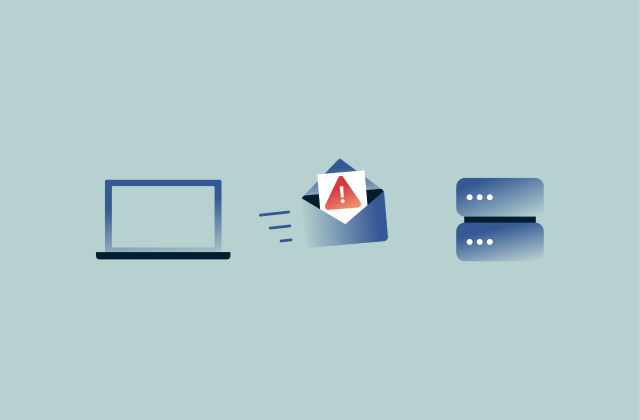Protect your privacy: A guide to data removal services

Your personal information, like your name, home address, phone number, and even details about your household members and relatives, can be collected and sold by companies known as data brokers. These companies build extensive profiles on you and then sell this data to almost anyone who’s willing to purchase them.
In worst-case scenarios, this exposure of your personal information can lead to threats like targeted scams and identity theft. That’s why it’s critical to understand what information about you is out there, who has it, and how it’s being used.
Taking control of your data starts with understanding and managing the information that’s available about you. This article reviews tools and services that can help you do just that.
Please note: This information is for general educational purposes and not financial or legal advice.
What is data removal?
Data removal is the process of asking data brokers and people search sites to delete or suppress your personal data and then tracking those requests so the same records don’t appear again.
The goal is to shrink your digital footprint, protect your privacy, and prevent your data from being used or sold without your consent. However, the extent of removal depends on the laws in your region and the practices of each website or broker.
How data brokers operate
Data brokers collect information from a variety of sources, including publicly available records (like property deeds, court filings, and voter rolls) and commercial partners (such as credit bureaus, retailers, apps, and social media).
They combine and analyze this data to create detailed profiles, which can include everything from your gender, age, marital status, location histories, and income to your inferred political views and health concerns.
These profiles are then sold or shared with a range of potential users, including employers, recruiters, marketers, political organizations, insurance providers, scammers, and spammers. Certain government and law enforcement agencies may also access this information for specific purposes.
Where data brokers find your data
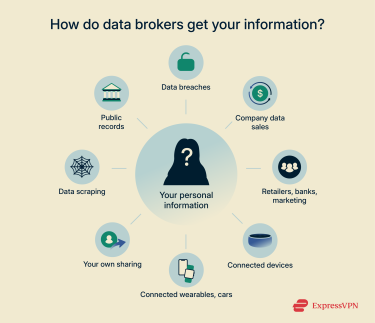 Data brokers can pull your information from a wide range of online and offline sources. Their most common sources include:
Data brokers can pull your information from a wide range of online and offline sources. Their most common sources include:
- Public records: These can include property records, voter registration lists, court documents, and other documents that are accessible to the public.
- Companies that sell your data: The businesses you buy from sometimes sell or trade your personal data. Banks, retailers, and marketing firms can package customer information and provide it directly to data brokers as part of their business model.
- Data you give away: You typically hand over personal details every time you sign up for an app, enter a contest, or fill out a warranty card. Brokers can also use tracking cookies and pixels to monitor your activity across websites and social media, seeing what you search for, buy, and “like.”
- Automated data scraping: Brokers may use tools to gather publicly posted information from websites, forums, and social networks. A well-known example is Clearview AI, which scraped billions of photos from social media to build a facial recognition database that it then sold to law enforcement.
- Connected devices: Smart TVs, voice assistants, smart watches, security cameras, and even modern cars can collect vast quantities of data about your habits and usage patterns. While data brokers usually don’t access these devices directly, some of the companies that operate them may sell or share aggregated data, which brokers can then use to enhance profiles.
- Data breaches: If a company you’ve shared information with experiences a security breach, your personal data may be exposed and later included in broker databases.
Brokers combine these various data points to create detailed profiles, which can then be accessed by their clients.
What are the risks when personal data is exposed?
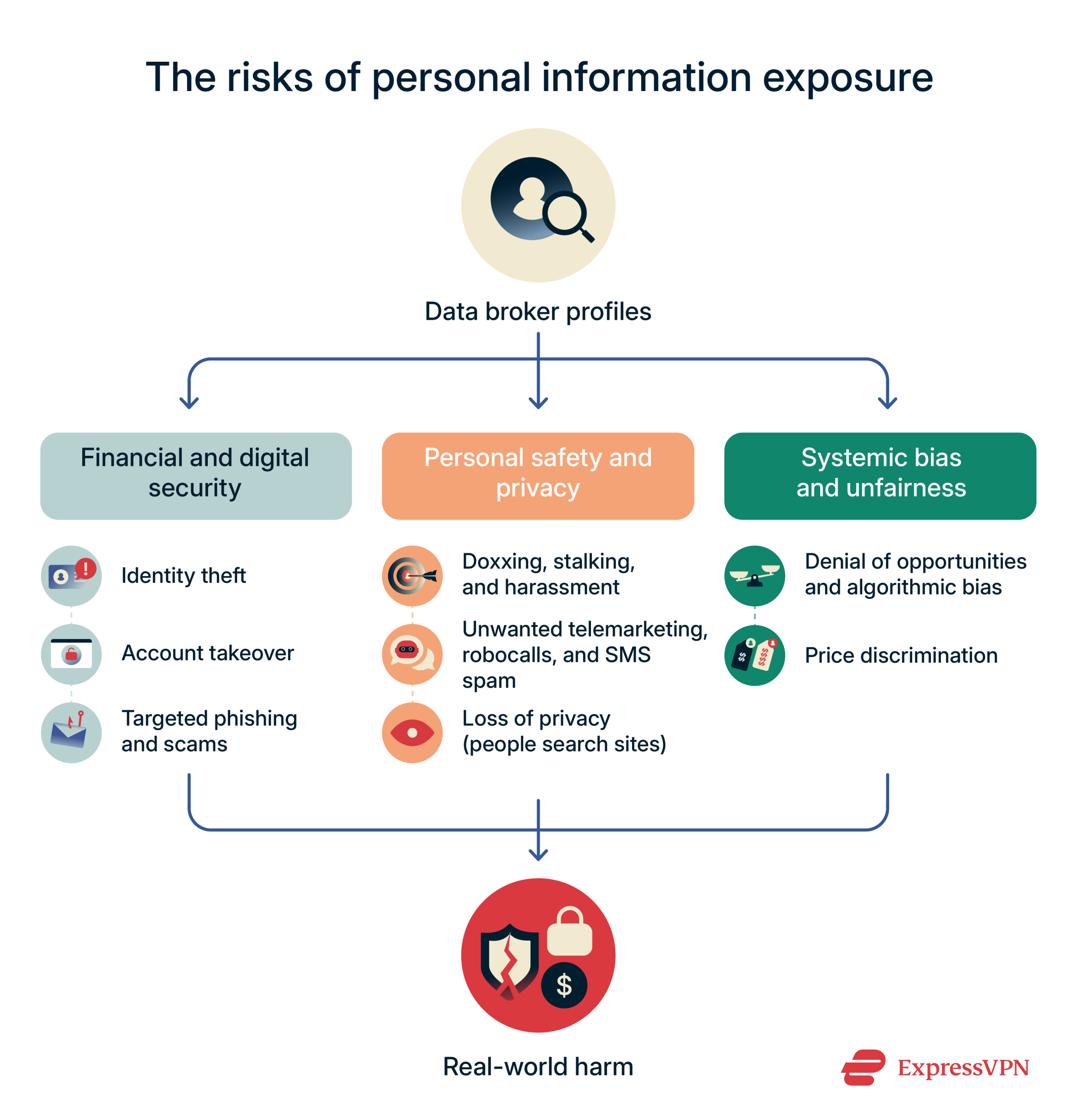 Companies and other interested parties can buy or look up profiles, then link them to your real life. Here’s what’s at stake when your data sits in broker files.
Companies and other interested parties can buy or look up profiles, then link them to your real life. Here’s what’s at stake when your data sits in broker files.
1. Identity theft and account takeovers
Criminals who access enough of your personal data might be able to open credit accounts in your name, file fraudulent tax returns, or attempt to access your existing financial accounts. The effects of such identity theft can include account lockouts, drained accounts, and new account fraud.
2. Targeted phishing and scams
Scammers may use detailed personal profiles to make their attacks more believable. An email or text message that includes your name, address, and recent purchase history is more likely to trick you into clicking a malicious link or providing sensitive information.
3. Doxxing, stalking, and harassment
The public availability of your personal details on people search sites could potentially make doxxing, stalking, and real-world harassment easier for bad actors.
For example, abuse survivors often fear being found after moving or changing jobs, and some avoid legal help or new housing to keep fresh records out of broker files. Public officials such as law enforcement officers and judges can also be at risk, as criminals may be able to purchase home addresses and family details to target them and their families.
4. Increase in robocalls and telemarketing calls
Data brokers often sell phone numbers alongside other personal information. Once your number is in their databases, you may see a spike in unwanted robocalls, telemarketing calls, and SMS spam. These calls can be persistent, intrusive, and sometimes even fraudulent, attempting to trick you into sharing financial or personal information. The more widely your phone number is circulated, the harder it becomes to avoid these nuisance calls.
5. Price discrimination
Companies can use the profile data they buy to offer different prices to different people for the same product. If your data profile suggests a high income, you may be shown higher prices for flights, hotels, or other goods.
6. Denial of opportunities and algorithmic bias
Data broker profiles are sometimes used to make automated decisions about individuals. This information can influence the insurance rates you’re offered, the credit limit you receive, or even whether a recruiter sees your resume. Inaccurate or out-of-context data can lead to you being unfairly denied opportunities without a clear reason or recourse.
7. Loss of privacy
Anyone, from a curious neighbor to a potential employer, could look you up on a people search site. If your information has been shared or sold, they may find sensitive information like your home address, phone number, or even the names of your relatives.
How to evaluate a data removal service
Choosing the best data removal service can be difficult. You're handing over sensitive information, so you need to trust the company you choose. Here’s what to look for.
Key features every reliable data removal service should offer
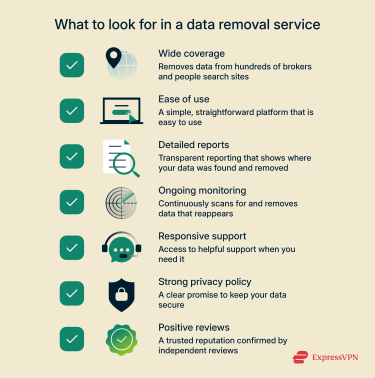
- Wide coverage: A good service will remove your data from hundreds of different data brokers and people-search sites, not just a handful. The more platforms it covers, the better.
- A simple platform: The process of submitting your information should be straightforward. If the website is confusing or difficult to navigate, it may be a sign of a less user-friendly service.
- Detailed reporting: A good service will show you exactly where your data was found and which records have been removed. This transparency lets you see that you're getting what you paid for.
- Ongoing monitoring: Your data can reappear online, so a good data removal service will offer continuous scanning. It should also provide suppression options for brokers that don’t delete data but will agree not to show it.
- Good customer support: If you have a question or a problem, you should be able to get help from a real person without difficulty.
- A strong privacy policy: This is a critical point; the service will be handling your personal data, so it should demonstrate a commitment to keeping this data secure.
- Positive independent reviews: Check the service’s reputation on trusted technology websites or consumer review platforms. A long-standing positive history is a strong signal of reliability.
ExpressVPN’s Data Removal helps locate personal information on major data brokers and people-search sites. A free tool (for U.S. users) tells you which data brokers have your information, while the version bundled with other Identity Defender features (available on select tiers for U.S. users) can automatically submit removal requests on your behalf and provide ongoing monitoring to help prevent your data from reappearing on these sites.
Why ongoing monitoring outperforms one-time data removal
Even after you remove your information, it can come back. Data brokers are constantly collecting information, so a one-time removal is just a temporary fix.
This is why ongoing monitoring is valuable. A good service like ExpressVPN’s Data Removal doesn't just remove your data once; it continuously scans for it and removes it again whenever it pops up. This is a multi-layered approach that a single cleanup can't match.
How to check a service’s privacy policy and transparency level
It’s important to read the privacy policy carefully, because you need to know how the data removal service handles your information: what they collect, how long they keep it, and who they share it with. A trustworthy company’s privacy policy will state these terms clearly.
Best types of data removal service
There are a few different types of services out there. Some focus only on removing your data from broker sites, while others bundle this service with more security tools.
Automated opt-out services for data brokers
These services specialize in removing personal data from data brokers and people-search websites. They’re particularly useful if this is your primary concern.
Integrated privacy protection suites with data removal
If you want more than just data removal, a full privacy suite is a good option. These services combine data deletion with other tools such as a virtual private network (VPN), password manager, and other identity protection tools for multi-layered online safety.
ExpressVPN, for instance, offers a range of privacy and security tools with its tiered subscriptions. All subscriptions include ExpressVPN Keys, a secure password manager available worldwide that helps protect your credentials.
For users in the U.S., Identity Defender provides a comprehensive, multi-layered solution for safeguarding your identity. This suite of tools includes:
- Data Removal: A data removal service that scans broker sites and requests removal on your behalf.
- ID Alerts: Dark web monitoring scans the dark web for your personal information.
- ID Theft Insurance: Up to $1 million* in identity theft insurance.
- Credit Scanner: Monitors your credit score and activity, providing alerts and tools to detect and address potential identity theft.
This makes ExpressVPN a good choice for U.S. users who want to combine browsing privacy with tools to manage their existing digital footprint.
DIY data removal options for hands-on users
It’s possible to remove your data from brokers on your own, but it’s a time-consuming process. Success typically requires submitting opt-out requests across many different sites and repeating those requests on a regular basis, since your information often resurfaces.
Resources like the Electronic Privacy Information Center (EPIC) maintain lists of data brokers and opt-out links, which can help you identify where your data is circulating. You may also notice your information appearing on popular people-search websites, which can serve as a starting point for tracking down brokers that hold your details.
Building a complete privacy strategy and data protection plan
A data removal service is just one piece of the online privacy puzzle. For more comprehensive safety and privacy, you need a plan that protects your information from multiple angles.
The role of VPNs in preventing new data collection
A virtual private network (VPN) like ExpressVPN is a foundational privacy tool. When you use a VPN, it creates a private connection between your device and the internet, encrypting your traffic and hiding your IP address.
This stops your internet service provider (ISP) from seeing which websites you visit and makes it much harder for websites, advertisers, and data trackers to follow you across the web. Using a VPN is a proactive step that reduces the amount of new data that can be collected about you in the first place.
How credit and identity monitoring add extra protection
Data removal services work to take your personal information off the open market, while credit monitoring alerts you if that data is ever used to commit fraud. These services watch your credit files for suspicious activity, like new accounts being opened in your name. If something strange pops up, you get an alert.
Similarly, ID Alerts scan the web, including the dark web, for your personal information. If your name, email, Social Security number (SSN), or credit card details appear on the dark web, the service notifies you.
Many integrated privacy suites now include these features; for example, ExpressVPN’s Identity Defender actively scans the dark web for your credentials and includes Credit Scanner to pick up on any suspicious financial activity.
Combining data removal with other privacy tools
The best approach is to use several tools that work together. While you could get these from different providers, a more streamlined strategy is to use an integrated privacy suite like ExpressVPN’s. This simplifies your protection by bringing many of the necessary tools under one roof.
Your VPN is the first line of defense, encrypting your data and making you harder to track. A data removal service is your cleanup crew, getting rid of data that’s already out there. And identity monitoring is your alarm system, warning you of immediate threats.
When you combine these privacy protection tools with other good habits, like using a password manager and enabling two-factor authentication (2FA) on all your important accounts (ExpressVPN Keys can generate and store these 2FA codes for you), you create a strong defense.
It’s also a good idea to use a privacy-focused browser and to invest in a reliable antivirus to keep data-stealing malware away from your devices.
Privacy protection tips beyond data removal
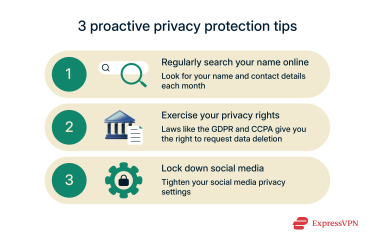 Data removal services are powerful, but good habits are just as important. Here are a few things you can do to boost your online safety.
Data removal services are powerful, but good habits are just as important. Here are a few things you can do to boost your online safety.
1. Regularly search your name and contact details online
Once a month, do a quick search for your own name, phone number, and address. Use a private browsing window so your past searches don't influence the results. This is a simple way to spot new information leak issues.
Tip: You can automate this with a free tool from Google. In your Google account dashboard, navigate to the “Results about you” feature. You can add your personal contact details, and Google will then monitor its search results for that information. If it finds a new result containing your data, it will notify you and provide a streamlined way to request its removal from Google’s index.
2. Use privacy laws like GDPR and CCPA to request data deletion
Depending on where you live, you may have legal rights to control your data. Laws like Europe's General Data Protection Regulation (GDPR) and the California Consumer Privacy Act (CCPA) grant you the right to delete your data.
This is your legal right to request that any company, from a data broker to a social media platform or an online store, delete the personal information it holds about you. The company is legally obligated to comply, though some exceptions apply (for example, if they need the data to complete a recent transaction or for other legal reasons).
How to exercise your right:
- First, identify the specific company from which you want to request your data be removed.
- Visit the company’s website and locate its privacy policy to find a dedicated link or portal for data requests.
- Submit your request through their official form or email, clearly stating you’re exercising your right to deletion under a specific law like GDPR or CCPA.
- Be prepared to provide the necessary information to verify your identity, which is a required security measure to protect your account.
While this is a powerful manual option for data removal, it requires a significant time investment, as you must repeat the entire process for every company that has your data.
3. Lock down your social media privacy settings
Take the time to go into the privacy settings on each platform you use, such as Facebook, Instagram, and LinkedIn. Set your posts and personal details, like your friends list, location, and birthday, to be visible to “Connections” or “Friends only.” This single step makes it much harder for automated tools to gather your information.
FAQ: Common questions about data removal services
Can I remove my data myself?
Yes, you can. It just takes a lot of time and effort. You have to find each data broker or people search site individually, go to their website, locate their opt-out page, and submit a removal request. Then you have to repeat the process for the next broker, and the next, and keep on rechecking every few months to see if any of your data reappeared.
How long does data removal take?
It varies. Some brokers will process a removal request in a few days. Others can take up to a few months. Processing times can also vary due to legal requirements; for example, the California Consumer Privacy Act (CCPA) gives brokers a 45-day grace period to respond to requests.
Are data removal services safe?
Reputable services like ExpressVPN’s Data Removal are safe. The most important thing to check is the privacy policy to see what data is collected, how it’s used, how it’s stored and protected, and whether it’s shared with third parties. A clear, transparent policy is a good sign; if it’s vague or confusing, that’s a red flag.
How do I keep my data off the internet after removal?
Data can reappear online even after you’ve removed it, so ongoing monitoring is key, whether you handle it yourself or use a data removal service. On top of that, use a trusted VPN to hide your online activity and be very mindful of the information you share with new apps, websites, and services.
Do data removal services really work?
Yes, they do. They automate a very tedious process and are effective at getting your information removed from the most common data broker and people search sites. You can typically track the results if your service provides regular progress reports.
How much do data removal services cost?
Most services operate on a subscription model. You can expect to pay somewhere between $5 and $25 per month, with most companies offering a discount if you sign up for a full year. Pricing also depends on whether you’re getting a standalone tool or a full privacy suite. With ExpressVPN, the Data Removal service is included with the Pro tier for U.S. users, which can save potentially hundreds of dollars a year compared with subscribing to standalone services.
Can VPNs help prevent future data collection?
A VPN is an important part of your overall online privacy and security toolkit. By encrypting your traffic and hiding your IP address, a secure connection from a VPN makes it much harder for websites, advertisers, and your internet provider to track what you do online and collect your personal data.
It’s important to use a VPN alongside other privacy and security tools while maintaining good digital hygiene and safeguarding your devices, accounts, identities, activity, communications, and more.
*The insurance is underwritten and administered by American Bankers Insurance Company of Florida, an Assurant company, under group or blanket policies issued to Array US Inc. or its respective affiliates for the benefit of its Members. Please refer to the actual policies for terms, conditions, and exclusions of coverage. Coverage may not be available in all jurisdictions. Review the Summary of Benefits.
Take the first step to protect yourself online. Try ExpressVPN risk-free.
Get ExpressVPN







